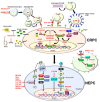Developing New Treatment Options for Castration-Resistant Prostate Cancer and Recurrent Disease
- PMID: 36009418
- PMCID: PMC9405166
- DOI: 10.3390/biomedicines10081872
Developing New Treatment Options for Castration-Resistant Prostate Cancer and Recurrent Disease
Abstract
Prostate cancer (PCa) is a major diagnosed cancer among men globally, and about 20% of patients develop metastatic prostate cancer (mPCa) in the initial diagnosis. PCa is a typical androgen-dependent disease; thus, hormonal therapy is commonly used as a standard care for mPCa by inhibiting androgen receptor (AR) activities, or androgen metabolism. Inevitably, almost all PCa will acquire resistance and become castration-resistant PCa (CRPC) that is associated with AR gene mutations or amplification, the presence of AR variants, loss of AR expression toward neuroendocrine phenotype, or other hormonal receptors. Treating CRPC poses a great challenge to clinicians. Research efforts in the last decade have come up with several new anti-androgen agents to prolong overall survival of CRPC patients. In addition, many potential targeting agents have been at the stage of being able to translate many preclinical discoveries into clinical practices. At this juncture, it is important to highlight the emerging strategies including small-molecule inhibitors to AR variants, DNA repair enzymes, cell survival pathway, neuroendocrine differentiation pathway, radiotherapy, CRPC-specific theranostics and immune therapy that are underway or have recently been completed.
Keywords: castration-resistant prostate cancer; precision medicine; recurrent therapy and castration-resistant prostate cancer.
Conflict of interest statement
The authors declare no conflict of interest.
Figures
Similar articles
-
Androgen receptors in hormone-dependent and castration-resistant prostate cancer.Pharmacol Ther. 2013 Dec;140(3):223-38. doi: 10.1016/j.pharmthera.2013.07.003. Epub 2013 Jul 13. Pharmacol Ther. 2013. PMID: 23859952 Review.
-
Transcript Levels of Androgen Receptor Variant 7 and Ubiquitin-Conjugating Enzyme 2C in Hormone Sensitive Prostate Cancer and Castration-Resistant Prostate Cancer.Prostate. 2017 Jan;77(1):60-71. doi: 10.1002/pros.23248. Epub 2016 Aug 22. Prostate. 2017. PMID: 27550197
-
The prognostic significance of loss of the androgen receptor and neuroendocrine differentiation in prostate biopsy specimens among castration-resistant prostate cancer patients.Mol Clin Oncol. 2013 Mar;1(2):257-262. doi: 10.3892/mco.2013.69. Epub 2013 Jan 14. Mol Clin Oncol. 2013. PMID: 24649157 Free PMC article.
-
Mechanisms of resistance in castration-resistant prostate cancer (CRPC).Transl Androl Urol. 2015 Jun;4(3):365-80. doi: 10.3978/j.issn.2223-4683.2015.05.02. Transl Androl Urol. 2015. PMID: 26814148 Free PMC article. Review.
-
Androgen receptor: what we know and what we expect in castration-resistant prostate cancer.Int Urol Nephrol. 2018 Oct;50(10):1753-1764. doi: 10.1007/s11255-018-1964-0. Epub 2018 Aug 20. Int Urol Nephrol. 2018. PMID: 30128923 Review.
Cited by
-
H3 histone methylation landscape in male urogenital cancers: from molecular mechanisms to epigenetic biomarkers and therapeutic targets.Front Cell Dev Biol. 2023 May 9;11:1181764. doi: 10.3389/fcell.2023.1181764. eCollection 2023. Front Cell Dev Biol. 2023. PMID: 37228649 Free PMC article. Review.
-
MicroRNA-122 targets δ-catenin to suppress the tumorigenic potential of prostate cancer cells.Am J Cancer Res. 2022 Oct 15;12(10):4853-4864. eCollection 2022. Am J Cancer Res. 2022. PMID: 36381334 Free PMC article.
-
Complexities of Prostate Cancer.Int J Mol Sci. 2022 Nov 17;23(22):14257. doi: 10.3390/ijms232214257. Int J Mol Sci. 2022. PMID: 36430730 Free PMC article. Review.
-
Discovery and Validation of Novel microRNA Panel for Non-Invasive Prediction of Prostate Cancer.Cureus. 2024 Apr 13;16(4):e58207. doi: 10.7759/cureus.58207. eCollection 2024 Apr. Cureus. 2024. PMID: 38741808 Free PMC article.
-
Strategies to Re-Sensitize Castration-Resistant Prostate Cancer to Antiandrogen Therapy.Biomedicines. 2023 Apr 6;11(4):1105. doi: 10.3390/biomedicines11041105. Biomedicines. 2023. PMID: 37189723 Free PMC article. Review.
References
-
- Virgo K.S., Basch E., Loblaw D.A., Oliver T.K., Rumble R.B., Carducci M.A., Nordquist L., Taplin M.E., Winquist E., Singer E.A. Second-Line Hormonal Therapy for Men with Chemotherapy-Naïve, Castration-Resistant Prostate Cancer: American Society of Clinical Oncology Provisional Clinical Opinion. J. Clin. Oncol. 2017;35:1952–1964. doi: 10.1200/JCO.2017.72.8030. - DOI - PubMed
Publication types
Grants and funding
LinkOut - more resources
Full Text Sources
Other Literature Sources
Research Materials


